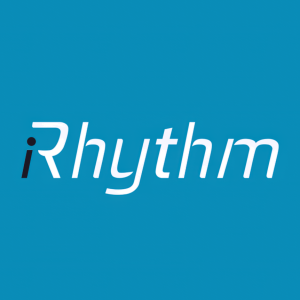iRhythm Technologies Announces Results of GUARD-AF Trial
Rhea-AI Summary
iRhythm Technologies (NASDAQ:IRTC) presented results from the GUARD-AF trial at the European Society of Cardiology Congress 2024. The trial, using iRhythm's Zio® XT patch for long-term continuous monitoring (LTCM), aimed to evaluate screening for undiagnosed atrial fibrillation (AF) in elderly individuals.
Key findings include:
- Screening with Zio® XT LTCM led to increased AF diagnosis (5.0% vs 3.3%) over 15 months
- No significant difference in stroke hospitalization rates
- Increased oral anticoagulation initiation in the screened group (4.2% vs 2.8%)
- 88% of detected AF cases were low-burden paroxysmal AF
The study demonstrates the feasibility of primary care-initiated, home-based monitoring for AF detection in older populations.
Positive
- Increased AF diagnosis rate (5.0% vs 3.3%) using Zio® XT LTCM
- Higher initiation of oral anticoagulation in the screened group (4.2% vs 2.8%)
- No increase in hospitalization for bleeding in the screened group
- Successful implementation of virtual, home-based diagnostics with high wear time and analyzable data
- Demonstrated feasibility of large-scale pragmatic trials using Zio LTCM service
Negative
- No significant difference in stroke hospitalization rates between screened and usual care groups
- Study stopped before achieving planned enrollment of 52,000 patients, reducing statistical power
News Market Reaction – IRTC
On the day this news was published, IRTC declined 4.06%, reflecting a moderate negative market reaction.
Data tracked by StockTitan Argus on the day of publication.
- GUARD-AF trial results presented at European Society of Cardiology (ESC) Congress 2024
- Leveraging iRhythm’s Zio® patch-based long-term continuous monitoring (LTCM), GUARD-AF is the largest randomized trial in a primary care setting to evaluate the impact of screening for undiagnosed atrial fibrillation (AF)
- Screening with iRhythm’s Zio® XT1 LTCM led to increase in new diagnosis of AF (
5.0% vs3.3% ) over an average follow-up of 15 months. - No difference in stroke hospitalization vs usual care in the context of reduced statistical power due to truncated enrollment and follow-up.
SAN FRANCISCO, Sept. 01, 2024 (GLOBE NEWSWIRE) -- iRhythm Technologies, Inc. (NASDAQ:IRTC), a leading digital health care company focused on creating trusted solutions that detect, predict, and prevent disease, today announced the presentation and publication of the GUARD-AF (ReducinG stroke by screening for UndiAgnosed atRial fibrillation in elderly inDividuals) randomized clinical trial at the European Society of Cardiology (ESC) Congress 2024. The trial was sponsored by Bristol-Myers Squibb-Pfizer Alliance and iRhythm provided the Zio XT patch ECG long-term continuous monitoring (LTCM) monitor used in the interventional (screening) arm of the study.
GUARD-AF was a prospective, parallel-group, randomized controlled trial designed to test whether screening for AF in people aged ≥70 years using an on-label Zio® XT 14-day single-lead LTCM could identify patients with undiagnosed AF and reduce stroke. Participants were randomized 1:1 to screening with Zio XT LTCM or usual care. The primary efficacy and safety outcomes were hospitalization due to all-cause stroke and bleeding, respectively.
During a median follow-up of 15 months in 11,905 enrolled patients from 149 primary care sites in the US (5,952 assigned to screening), the study found that Zio XT LTCM led to an increase in new diagnosis of AF vs usual care (5.0 vs
“Owing in part to the low event rate and truncated enrollment, the study found no reduction in the rate of stroke,” said Dr. Lopes. “However, there are some important lessons here. Our study confirms that AFib is common in older patients and can be identified with cardiac monitoring in primary care — upstream of cardiology care, which many patients will not have access to. Most participants with AFib also had short, infrequent episodes that would be missed with a pulse check, single ECG, shorter duration of monitoring. Identification of these short episodes could be a useful prompt for physicians to more aggressively treat heart disease risk factors and may reduce the downstream risk of heart failure, which will be evaluated in future trials.”
The study had several notable implications:
- Screening with Zio XT LTCM led to an increase in diagnosis of AF over the maximum 2.5 years of follow up vs usual care (
5.0% vs3.3% ), an increase in initiation of oral anticoagulation that is used for prevention of stroke in AF (4.2% vs2.8% ), and no increase in the rate of hospitalization for bleeding.3 - Primary care-initiated home-based monitoring in an older population is feasible. GUARD-AF is the largest randomized trial to evaluate the impact of AF screening with a patch-based ECG monitor on care delivery in a primary care setting; more than half of participants enrolled were women.3
- Virtual, home-based diagnostics are feasible. In GUARD-AF,
20% of participants were enrolled virtually and received the Zio XT LTCM device by mail for self-application. Wear time and analyzable time were similar and high in self-applied and clinic-applied groups3, confirming prior studies and clinical experience with Zio LTCM service.5 - In the 252 participants with AF detected on 14-day LTCM, most (
88% ) had low-burden paroxysmal AF. Of those with detected AF, most had AF <1.0% of the time3, suggesting that many patients with diagnosed AF may miss detection with 12-lead ECG (10 seconds), smartwatch ECG (30 seconds), or ambulatory monitoring of shorter duration such as 48 hours. Only 32 of 252 had AF at the start of the ECG recording.
Additionally, this research underscores how large pragmatic trials powered by the Zio LTCM service are feasible at scale. iRhythm’s clinical research services have supported over 100 prospective studies at nearly 500 sites in over 40,000 participants.
“These findings support the totality of evidence that undiagnosed AFib is common and can be found with Zio’s 14-day long-term monitoring — even when it is not likely to be found with point-of-care ECGs or short-term monitors due to the short, infrequent episodes in the early stages of atrial fibrillation,” said Mintu Turakhia MD, iRhythm’s Chief Medical and Scientific Officer and EVP, Product Innovation. “iRhythm’s undiagnosed arrhythmia pilot programs leverage many features seen in GUARD-AF, such as virtual enrollment and self-applied patches at home. These programs, as well as ongoing clinical trials, such as AMALFI6, and those in development will have longer follow-up or assess a wider range of outcomes, including heart failure, which occurs in one-third of patients with AFib, along with cardiovascular hospitalization, health care utilization, and costs.”
Also at ESC, Evangelos Hytopoulos, PhD, iRhythm’s Sr. Director of Data Science, presented separate work performed in collaboration with Scripps Research, New insights from the ECG: screening and prediction7, that used machine learning on ECG signal of 14-days of patch-based monitoring without AF to successfully predict episodes of AF in the subsequent year. The research presented is part of a scientific study only and is not part of any commercial product offering in any market.
About iRhythm Technologies, Inc.
iRhythm is a leading digital health care company that creates trusted solutions that detect, predict, and prevent disease. Combining wearable biosensors and cloud-based data analytics with powerful proprietary algorithms, iRhythm distills data from millions of heartbeats into clinically actionable information. Through a relentless focus on patient care, iRhythm’s vision is to deliver better data, better insights, and better health for all. To learn more about iRhythm, go to iRhythmtech.com.
Forward-Looking Statements
This press release contains forward-looking statements within the meaning of Section 27A of the Securities Act of 1933 and Section 21E of the Securities Exchange Act of 1934 and the Private Securities Litigation Reform Act of 1995. These statements include statements regarding clinical developments and market opportunity. Such statements are based on current assumptions that involve risks and uncertainties that could cause actual outcomes and results to differ materially. These risks and uncertainties, many of which are beyond our control, include risks described in the section entitled “Risk Factors” and elsewhere in the company’s public filings with the Securities and Exchange Commission. These forward-looking statements speak only as of the date hereof and should not be unduly relied upon. iRhythm disclaims any obligation to update these forward-looking statements.
iRhythm Contact Information
Investor Relations Contact
Stephanie Zhadkevich
investors@irhythmtech.com
Media Contact
Kassandra Perry
irhythm@highwirepr.com
1 The Zio XT Patch is a prescription-only, single patient use, continuously recording ECG monitor that can be worn up to 14 days. It is indicated for use on patients who may be asymptomatic or who may suffer from transient symptoms such as palpitations, shortness of breath, dizziness, light-headedness, pre-syncope, syncope, fatigue, or anxiety.
2 Singer DE, et al. American Heart Journal. 2022 Jul:249:76-85. doi: 10.1016/j.ahj.2022.04.005.
3 Lopes RD, et al. J Am Coll Cardiol. 2024.
4 Singer DE, et al. JACC Clin Electrophysiol. 2024.
5 Goergen JA, et al. Heart Rhythm. 2023 Mar;20(3):407-413. doi: 10.1016/j.hrthm.2022.11.020.
6 About AMALFI https://www.amalfitrial.org/about
7 M Gadaleta, et al, Predicting 1-year atrial fibrillation risk from a patch-based ambulatory ECG monitoring without atrial fibrillation, European Society of Cardiology (ESC) 2024 Congress, August 30 – September 2, London.








